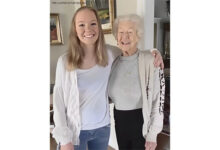HE CAME INTO THE STORE EVERY TUESDAY—AND TODAY, HE COULDN’T REMEMBER WHY
He came into the store every Tuesday—like clockwork. Rain or shine, windbreaker zipped to his neck, cane tapping rhythmically across the tile floor. I started calling him Mr. A the way you nickname someone who feels like a part of the landscape. He’d give a sideways smile at that, the kind that barely tugged at the corners of his mouth but lit up his whole face just the same.
“Morning, Mr. A,” I’d say as he passed checkout three.
“Still working hard, Everett?” he’d reply, nodding toward my apron.
He always bought the same three things: a tin of sardines, a pack of McVitie’s digestive biscuits, and a small bag of black licorice. The sardines were for his lunch, the biscuits for his tea, and the licorice… well, I never asked. Probably nostalgia.
He was a kind of mystery I liked keeping intact.
But this Tuesday was different.
I spotted him down aisle 3, his cart half-full, standing still like someone had hit pause. He had a can of Campbell’s tomato bisque in one hand, his other white-knuckled around the cart’s handle. I could see the muscles in his jaw twitching like he was trying to remember something just out of reach.
I walked over slowly, careful not to spook him.
“You all right there, Mr. A? That tomato bisque still winning over the mushroom?”
He looked up at me like I was a stranger. Then down at the can. Then back at me.
“I don’t remember why I came in,” he said, voice barely a whisper.
There was a tremble in it I’d never heard before.
I gently took the can from his hand and set it in the cart. “You wanna sit down for a bit?” I asked. He nodded, once, as if even that was hard.
I helped him to the chair near the till, got him a bottle of cold water from the fridge section, and sat beside him. We didn’t speak for a while. Just sat in the hum of background music and beeping registers and carts squeaking across linoleum.
Eventually, I offered to walk him home.
“You sure?” he asked.
“Course. You know the way?”
“I think I still do,” he said, almost to himself.
He slid his arm through mine, and we walked slowly through the neighborhood streets. He pointed out places that no longer existed—the bakery that used to be a tailor, the diner that was once a movie house, the bench where he kissed his wife in 1956. The past seemed clearer to him than the present.
As we neared his building, his pace slowed.
His grip on my arm tightened.
“What if… what if I open the door and she’s not there?” he asked.
I thought he meant his wife had passed away, maybe years ago. It was a heartbreaking question, and I didn’t know how to answer. But I said, “Then I’ll be there with you. We’ll figure it out.”
He nodded, eyes a little glassy.
When we reached his stoop, he pulled a key from his windbreaker pocket with trembling hands. But when the door opened, the scene that greeted us wasn’t what I expected.
A woman stood in the hallway—petite, sharp-featured, gray hair in a tidy bun. She looked up with a tired kind of alertness, eyes scanning from him to me.
“Harold?” she said, voice steady but worn.
“I forgot,” he said. “I forgot what I was doing.”
She stepped forward and wrapped her arms around him. Not with panic or desperation—but with deep, bone-tired love. The kind that had weathered more storms than I could imagine.
“Come on,” she said, taking his other arm. “Let’s get you some tea.”
She looked at me over his shoulder. “Thank you. I’m Miriam.”
“Everett,” I said. “From the store.”
She smiled weakly. “I know who you are. He talks about you.”
I didn’t know what to say. So I just nodded and watched as she guided him inside.
Before the door shut, Harold looked back at me. “See you Tuesday?”
“You bet,” I said.
But he didn’t come the next Tuesday.
Or the one after that.
A month passed before I saw Miriam again. She came into the store alone, her hands deep in her coat pockets. I was restocking the soup aisle when I spotted her.
“Hey,” I said gently.
She gave me a small smile. “I didn’t think you’d recognize me without Harold.”
“Of course I do.”
She looked at the shelf, picked up a can of tomato bisque, held it like it might disappear.
“He passed three weeks ago,” she said, not looking at me.
I swallowed hard. “I’m sorry.”
She nodded. “It was peaceful. He forgot less when he was with you. I think you reminded him of… someone we used to know. Or maybe just who he used to be.”
That hit me harder than I expected.
We stood in silence for a moment, the weight of her words settling between us.
Then she added, “He left something for you.”
She reached into her bag and pulled out a small envelope. My name—Everett—written in neat cursive across the front.
I opened it right there in the aisle.
Inside was a photograph—black and white, edges worn soft. A younger version of Harold and Miriam, arms around each other, grinning on a summer day. On the back, in that same careful handwriting, was a note:
“For reminding an old man of who he was, and giving him something to look forward to every Tuesday. — Harold”
I didn’t cry right then. Not in the aisle. But I did later, after closing, when the store lights dimmed and the streets were quiet.
That photograph’s still in my wallet. Not just because of who gave it to me—but because of what it means. That the smallest kindness, the simplest routine, can matter more than we realize.
Now, every Tuesday, I take my break at 11:30 sharp. I grab a tin of sardines, a pack of biscuits, and a bag of licorice. I sit on the bench across from where the tailor used to be and think about Harold. About memory. About the strange, unexpected ways people find each other.
And I wonder:
Who are we showing up for, even when we don’t realize it?
If you felt something reading this, share it. You never know whose Tuesday you might brighten.

